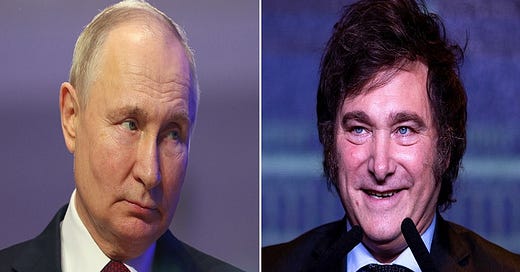The future of Russian-Argentine ties comes down to how mature Milei ultimately turns out to be. If he’s little more than a US fanboy at heart, then he’ll probably sell these strategic economic relations out in the coming months, but he’ll probably retain them if he’s as serious about his economic-centric worldview as he claims.
Many among the highly diverse collection of folks that comprise the non-Mainstream Media community, especially those that are leftist-aligned, were worried that Javier Milei’s ascension to the Argentine presidency would ruin ties with Russia. Those fears thus far haven’t panned out after his government actually expressed a willingness to retain pragmatic relations, even if they might lose some of their strategic element due to his explicit prioritization of Western countries in his own’s foreign policy.
Russian Ambassador to Argentina Dmitry Feoktistov said late last month that “there is reason to believe that our countries will maintain friendly relations…We have been assured that there will be no review of previously signed documents. There will be no setbacks in any areas.” This assessment followed his 90-minute meeting with new Foreign Minister Diana Mondino. According to him, “they are ready to interact with us and promote relations with a focus on trade, economic and investment cooperation.”
For her part, while she admitted in a subsequent interview that Milei’s decision to decline membership in BRICS was partially ideological, she added that it was “mainly practical” in order to “optimize” the use of his time. That explanation is plausible since he’s a reform-oriented leader regardless of however one feels about the changes that he’s championing. From his perspective, it makes sense to focus the bulk of his time on immediate domestic issues, and only after that will he think about others.
If the ideological component was as powerful as his critics in the non-Mainstream Media community suspect, especially those that are leftist-aligned, then the Russian Ambassador would have arrived at a different conclusion and accordingly conveyed it in as diplomatic of a way as possible. Moreover, Mondino wouldn’t have also said during the same interview above that “We will trade with those that pay more. This is not the state to make this decision. Our task is to create conditions for trade.”
It also deserves mentioning that Milei’s letter to his five permanent BRICS counterparts at the end of the year officially informing them of his decision reportedly reaffirmed his commitment to enhancing bilateral ties, “especially with regard to boosting trade and investment”, and meeting with each of them. This aligns with his economic-centric worldview, and it’ll help prevent the reversal of relevant progress that was achieved with Russia in recent years as documented by that country’s embassy here and here.
The only problem that might potentially arise is if reports from mid-December about his government’s plans to send two old Russian multipurpose helicopters to Ukraine turn out to be true. For what it’s worth, Ambassador Feoktistov said that he expects that this won’t happen, and that Argentina will maintain its military neutrality towards foreign conflicts. Nevertheless, it still can’t be ruled out, especially since the US might leverage its agents of influence to push him in this direction.
Milei obviously has a soft spot for the West in general and the US in particular so he’s already predisposed to whatever they might suggest on the foreign policy front if it’s presented as a “sign of civilizational solidarity” and a need to supposedly “prove” that he’s truly different than his predecessors. Judging from Ambassador Feoktistov’s assessments and the reported contents of Milei’s letter to his five permanent BRICS counterparts, he’s thus far holding firm and resisting speculative pressure on this.
That could of course change, however, in which case bilateral ties would predictably suffer. The consequent weakening of their strategic economic component as a result of his decision would go against his economic-centric worldview all in exchange for a pat on the back by US officials. Recalling that the State Department is largely staffed by liberal-globalists who are ideologically opposed to Milei, this means that he’d be selling out mutually beneficial ties with Russia for approval from his enemies.
The future of Russian-Argentine ties therefore comes down to how mature Milei ultimately turns out to be. If he’s little more than a US fanboy at heart, then he’ll probably sell these strategic economic relations out in the coming months, but he’ll probably retain them if he’s as serious about his economic-centric worldview as he claims. Based on whatever he decides to do, observers can then get a clear idea of who he really is, what he stands for, and how his country’s ties with others will likely evolve.




